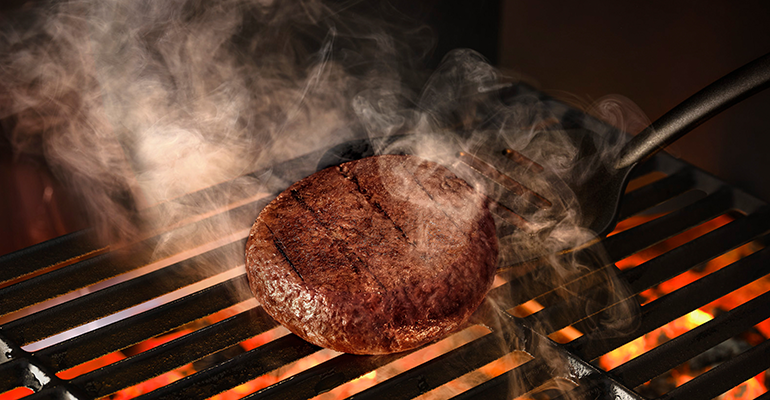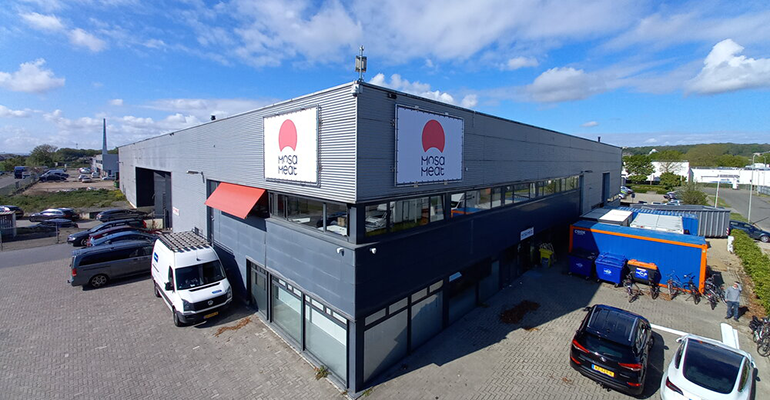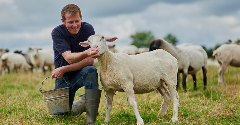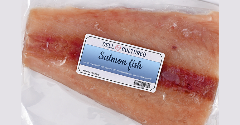News
Industry first: Mosa Meat becomes first cultivated meat startup to gain B Corp certification
11 Sep 2023
A first for the industry, Dutch cultivated meat company Mosa Meat announced that it has received B Corp certification and will soon apply for regulatory approval across the globe.
Cultivated meat, also known as lab-grown or cell-cultured meat, is transforming the way meat is produced and consumed. By culturing animal cells in bioreactors, manufacturers can create products that replicate the sensory and nutritional profiles of conventional meat, without the need for traditional animal farming.

Since Dutch scientists and Mosa Meat founders Mark Post and Peter Verstrate created the world’s first cultivated beef burger in Maastricht University a decade ago, the startup has established itself as a frontrunner in the cell cultured meat sector.
The recent approval supports Mosa Meat’s commitment to establishing a more sustainable food system and makes it the first cultivated meat company worldwide to receive B Corp certification.
"This certification validates our commitment to sustainable practices and ethical foundations as well as strengthens our position as trend setters in the global cellular agriculture movement,” said Maarten Bosch, CEO of Mosa Meat.
“We believe in creating real, delicious meat that positively impacts the climate and our food system and are optimistic that these values will be shared across the many stakeholders in our nascent field of cellular agriculture."
A commitment to sustainable food production
Cultivated meat eliminates the need for animal agriculture, a top contributor to climate change, and allows consumers to enjoy the same taste and texture as the meat they know and love by replicating the nutritional and sensory profiles of traditional meat. Cell-cultured products offer a sustainable alternative to conventional beef as cells from just one animal are needed to produce the same amount of ‘beef’ as countless cows.
 Credit: Mosa Meat
Credit: Mosa Meat
One estimate suggests that cell cultured meat could reduce land use by up to 95% and require 77% less water than its traditional counterparts.
Mosa Meat’s B Corp certification aligns with its mission to produce sustainable beef alternatives that mimic conventional beef on taste and texture, without harming the planet. Last May, the company unveiled the world’s largest cultivated meat facility, based in Maastricht and powered by 100% renewable energy sources.
Celebrity and sustainability advocate Leonardo DiCaprio who is an active advisor and investor in Mosa Meat said: “Mosa Meat continues to be a champion for change. I am proud to see Mosa Meat be the first cultivated meat company in the world to become B Corp Certified and hope it is the first of many,” he said.
Mosa Meat’s journey to B Corp certified
The B Corp certification by B Lab measures a company’s performance against a range of variables from environmental impact to employee benefits and community outreach.
 Pictured: Mosa Meat's pilot production facility | Credit: Mosa Meat
Pictured: Mosa Meat's pilot production facility | Credit: Mosa Meat
To achieve the certification, companies are required to undertake a stringent analysis process and satisfy a set of criteria which include scoring 80 or above on B Lab’s social and environmental risk review, ensuring all data is transparent and publicly accessible, and legally pledging accountability to stakeholders. Any business can apply to become a B Corp, but the pathway to certification varies dependent on criteria such as revenue, company size, and industry.
Following a year of in-depth evaluation, Mosa Meat became a B Corporation based on two Impact Business Models (IBMs). Resource Conservation is awarded to companies and products that limit resource use, such as water and energy, and Mission Locked recognises those that include all stakeholders, not just shareholders, in corporate decision-making processes.
With this certification, the startup joins a cohort of sustainability-focussed food companies with B corp certification such as Nespresso, Proper, and Abel & Cole.
A gateway to regulatory approval?
The announcement follows the launch of the National Growth Fund, a government scheme pledging €60 million in aim of making the Netherlands a global leader in cellular agriculture, and the Dutch government’s landmark approval of tastings of cultivated meat and seafood in controlled environments, earlier this year.
 Pictured: Mosa Meat meatball | Credit: Mosa Meat
Pictured: Mosa Meat meatball | Credit: Mosa Meat
The startup is hopeful that the B Corp certification will be a ring on the ladder on their journey to become regulated for sale and consumption in various countries across the world moving forward.
To date, the sale and consumption of cultivated meat is authorised in just two countries globally. Cell-cultured chicken from Eat Just and Upside Foods are approved for sale in Singapore, and from Good Meat and Upside Foods in the US.
Although the certification represents a step in the right direction for the company, regulatory approval may still be a long way off. The journey to approval is complex, requiring a thorough evidence-based risk assessment by the European Food Safety Authority (EFSA) and final approval from the European Commission.
Related news

California companies required to disclose heavy metal content in baby food
10 Jan 2025
As of January 2025, baby food manufacturers selling in California must disclose test results for four heavy metals – arsenic, lead, cadmium, and mercury – via an on-pack QR code.
Read more
Snack trends, ingredient claims, and plant-based perceptions: Highlights from Fi Europe 2023, part 1
7 Dec 2023
Value-led snacking, sustainability storytelling, and the importance of having a ‘star ingredient’: we asked consumer analysts and market experts at Fi Europe about the trends and innovations that are shaping the food industry.
Read more
Confirmed: California bans four ‘toxic’ food additives
10 Oct 2023
Four food additives, including the colouring Red No. 3, will be banned in food in the US state of California over safety concerns, with public health campaigners hoping this will spark a nationwide ban in the coming years.
Read more
Advocacy groups condemn EU Commission for backpedalling on animal rights
3 Oct 2023
Amid rumours that the EU may abandon its plans to improve animal welfare in farming and end the use of cages, many stakeholders have condemned this possibility and urged the EU to reconsider.
Read more
Poland and Ukraine attempt to resolve grain dispute
29 Sep 2023
Poland and Ukraine have begun talks to try to resolve a dispute regarding the ban on Kyiv’s grain imports that prompted Kyiv to file a lawsuit to the World Trade Organization.
Read more
The EU may be set to scrap its sustainability commitments
27 Sep 2023
A speech delivered by President Ursula von der Leyen last week inferred that the EU could be drawing back on its commitments to create a more sustainable and healthier food system.
Read more
German supermarket trials climate-centric pricing model
29 Aug 2023
German discount supermarket Penny has trialled increasing product prices to mirror their health and environmental costs.
Read more
EPR fee delay spurs concerns over UK’s sustainability commitment
8 Aug 2023
The UK government’s decision to push back the introduction of fees for the Extended Producer Responsibility (EPR) due to inflation has raised doubts about whether this sustainability commitment will ever be realised.
Read more
Latino-owned food startups tackle climate change
25 Jul 2023
A growing list of Latino-founded food and beverage startups in the US are putting sustainability at the forefront of their businesses for the sake of the planet.
Read more
Industry first: The Netherlands approves cultivated meat and seafood tastings
17 Jul 2023
The Netherlands has become the first country in Europe to approve tastings of cultivated meat and seafood in controlled environments, yet there is still a long way to go before widescale commercialisation is achieved.
Read more